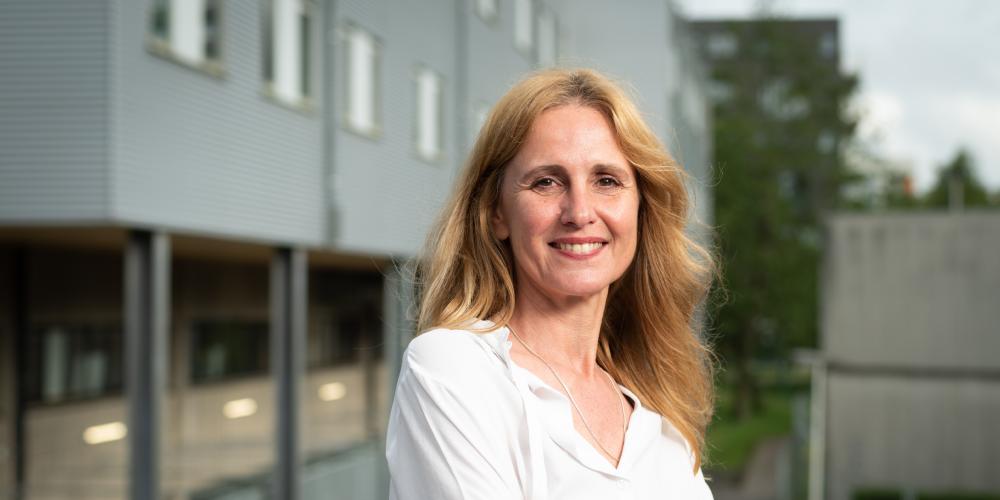
Political scientist Karen Celis researches the quality of democracy within the VUB Centre for Democratic Futures. “A lot of people are angry, demoralised and anxious about the future. Democratic innovations take very little account of those emotions.”
“We not only study what politics and democracy look like, but we also try to link that to innovations that can address democratic deficits and improve our political system.”
What could those innovations be?
“It could be about more participatory forms of democratic renewal, or how political parties can function better and how the relationship between citizens and elected politicians and democratic institutions can improve. With this focus in mind, we were invited to join the Horizon Europe project PLEDGE, which is investigating the emotional component of political protests that increasingly determine and threaten democratic functioning. The question is how these mechanisms work, which emotions in protest are good for our democracy and which can be undermining. The storming of the Capitol, for example, was an outburst of channelled anger that was not particularly good for democracy.”
"Angry citizen makes politicians listen to what is going on in society, keeps politicians on their toes and ultimately makes them function democratically."
How do you approach such research?
“There are 12 partners in PLEDGE, including a lot of political psychologists who are researching all kinds of emotions among people very closely involved in the Russia-Ukraine conflict, among other things. Environmental protests and populist groups are also in the empirical studies that we will conduct in Europe. The VUB group Democratic Futures focuses on thinking about and developing emotion-sensitive democratic innovation. A lot of people are angry, demoralised and anxious about the future, but democratic innovations take very little account of those emotions. In an ideal democracy, people’s problems are remedied, but they also feel heard, seen and acknowledged. Then the question arises, how can we design our democratic innovations in a way that they foster such feelings and thus strengthen democracy?”
Not every angry citizen will feel that they are undermining democracy, will they?
“No, certainly not. And an angry citizen makes politicians listen to what is going on in society, keeps politicians on their toes and ultimately makes them function democratically. But there are also political actors or entrepreneurs who understand very well that fearful and angry feelings can be used for anti-democratic purposes.”
Do you feel that the last election was determined more by emotions?
“There was certainly no change in style from previous ones. But it is clear that discontent has been building for quite some time, and you do see it emerging in our elections. Including by the fact that some 1.5 million Belgians did not vote, cast a blank vote or voted for the party Blanco. And there were a lot of protest votes. I would cautiously read into the election results that citizens have not given up hope and have started voting for something and not just against ‘The System’.
"We too often overlook is that populism also has a unifying discourse about the ‘we’"
“What is very dominant in the political scene today is that complex mix of anger, rage, frustration and outrage on the one hand and the hope and expectation of good governance on the other. We are seeing the rise of the far right in Europe that is playing the card of outrage and rejection of politics to the full. We must closely follow this evolution that can have anti-democratic consequences and try to reverse it when it goes in an anti-democratic direction.”
Do you find it difficult to define what is democratic and what is anti-democratic?
“It is certainly difficult to determine that precise point at which we no longer speak of a liberal democracy but, for example, an illiberal one. Like in Hungary, where democracy is being eroded to the point where only the wafer-thin layer of elections remains.”
What is striking is that populists are very good at playing on emotions. Are pro-democracy parties lacking that?
“Traditional parties are heavily outclassed by the emotional, affective strategies of populists. They speak straight to the heart and gut of the people in an efficient way. A lot of people today experience deficits economically, in education or in services, or cannot keep up with digitalisation. These experiences make them feel that they do not count, that they are being left behind. People react to this emotionally; they feel ashamed and blame themselves. That is a deeply human reaction. However, populism offers them the narrative that they are not to blame but “the others” are: the migrants, the Muslims, the woke elite, the feminists, the media... It is a simple and attractive narrative. But what we too often overlook is that populism also has a unifying discourse about the ‘we’. ‘We’ who are going back to taking care of each other. They argue for the warm community of yesteryear when everything was ‘better and normal’. But that original pure state never existed, nor, of course, is it true that everything used to be better.”